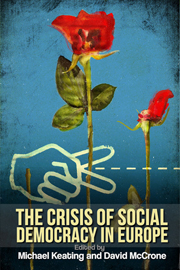Book contents
- Frontmatter
- Contents
- List of tables and figures
- About the contributors
- Preface
- 1 The crisis of social democracy
- 2 The Long Depression, the Great Crash and socialism in Western Europe
- 3 Social democracy in crisis: outlining the trends in Western Europe
- 4 The positions and fortunes of social democratic parties in East Central Europe
- 5 Rethinking public expenditure from a social democratic perspective
- 6 Social democracy in crisis? What crisis?
- 7 Can the Swedish social model survive the decline of the social democrats?
- 8 Multiculturalism, right-wing populism and the crisis of social democracy
- 9 Labour markets, welfare states and the dilemmas of European social democracy
- 10 Class politics and the social investment welfare state
- 11 Labour, skills and education in modern socio-economic development: can there be a social democratic economic and industrial policy in a globalised economy?
- 12 From single market to social market economy: is there room for solidarity?
- 13 Social democracy and security
- 14 Multilevel social democracy: centralisation and decentralisation
- 15 Conclusion
- Bibliography
- Index
1 - The crisis of social democracy
Published online by Cambridge University Press: 05 October 2013
- Frontmatter
- Contents
- List of tables and figures
- About the contributors
- Preface
- 1 The crisis of social democracy
- 2 The Long Depression, the Great Crash and socialism in Western Europe
- 3 Social democracy in crisis: outlining the trends in Western Europe
- 4 The positions and fortunes of social democratic parties in East Central Europe
- 5 Rethinking public expenditure from a social democratic perspective
- 6 Social democracy in crisis? What crisis?
- 7 Can the Swedish social model survive the decline of the social democrats?
- 8 Multiculturalism, right-wing populism and the crisis of social democracy
- 9 Labour markets, welfare states and the dilemmas of European social democracy
- 10 Class politics and the social investment welfare state
- 11 Labour, skills and education in modern socio-economic development: can there be a social democratic economic and industrial policy in a globalised economy?
- 12 From single market to social market economy: is there room for solidarity?
- 13 Social democracy and security
- 14 Multilevel social democracy: centralisation and decentralisation
- 15 Conclusion
- Bibliography
- Index
Summary
The state of social democracy
On the face of it, social democracy is in crisis. At the time of writing, there are very few left-of-centre parties in power in Western Europe. Norway, Denmark and Belgium have social democrat heads of government but in coalition, while the French Socialists govern thanks to divisions on the right and the electoral system. In Central and Eastern Europe, social democratic parties – whether new parties or former communist parties – have failed to fulfil their early promise.
Why should this be? One might take the view that it is all part of the electoral cycle, and that sooner or later social democratic parties will regain power. After all, they seemed to be doing very well in the late 1990s. Yet this does not account for their current and systematic electoral weakness wherever one looks, and begs the question as to what it was in the cycle itself that banished social democrats from office. A more sanguine view might be that ‘we're all social democrats now’, that the project has achieved success in building and institutionalising the welfare state; in other words, the demise of social democracy is, paradoxically, a function of its success. Other parties, in these circumstances, feel able to steal the social democrats' clothes. We might take the view that the triumph of capitalism is such that, having ameliorated the worst excesses of capitalism, social democracy rests content, or recognises that it has reached the limit of its achievements.
- Type
- Chapter
- Information
- The Crisis of Social Democracy in Europe , pp. 1 - 13Publisher: Edinburgh University PressPrint publication year: 2013



